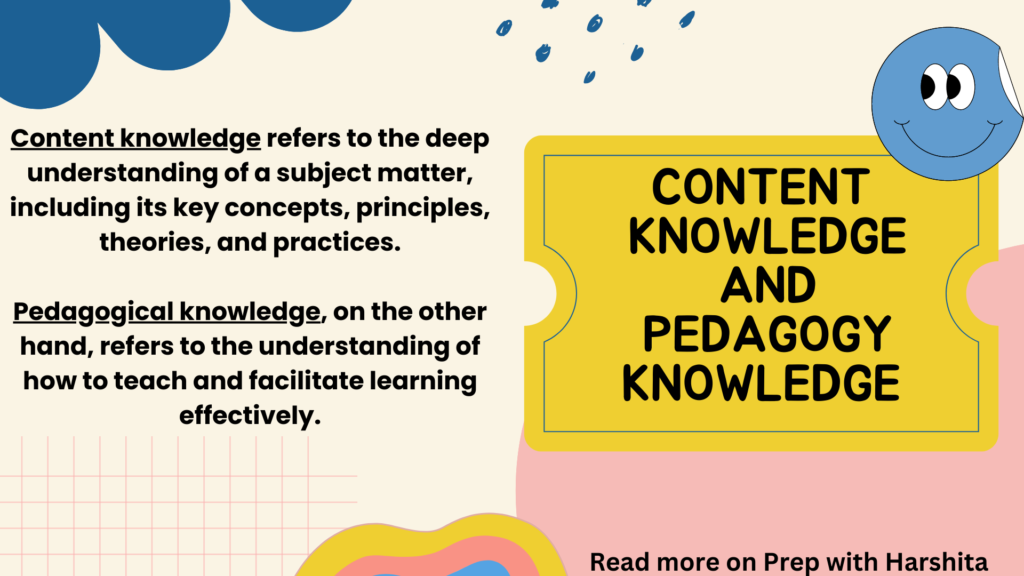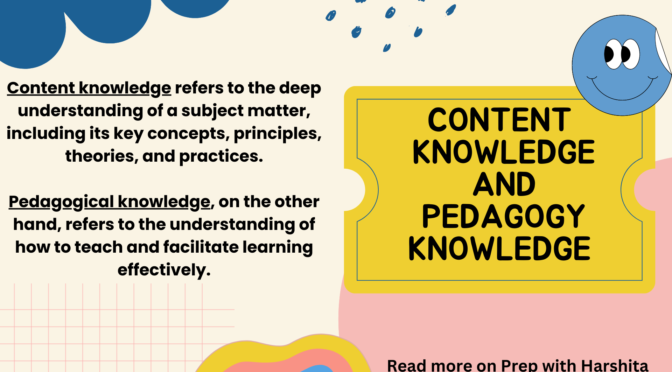Content knowledge refers to the deep understanding of a subject matter, including its key concepts, principles, theories, and practices.
It involves knowing the facts, concepts, theories, and principles that make up a particular discipline or field of study.
Content knowledge is critical for effective teaching as it enables the teacher to understand the subject matter they are teaching and to convey that knowledge effectively to their students.
Pedagogical knowledge, on the other hand, refers to the understanding of how to teach and facilitate learning effectively. It includes knowledge of teaching strategies, instructional design, assessment, classroom management, and student learning processes.
Pedagogical knowledge helps teachers to plan and deliver effective lessons that are engaging, accessible, and meaningful to their students.
Both content knowledge and pedagogical knowledge are essential for effective teaching. While content knowledge provides the foundation for teaching a subject, pedagogical knowledge ensures that the teacher is equipped with the skills and knowledge necessary to convey that content in a way that is meaningful and effective for their students. Teachers need to have a balance of both content and pedagogical knowledge to provide high-quality instruction that meets the needs of all students.
Bridging the gap between content knowledge and pedagogical knowledge requires intentional effort and ongoing professional development. Here are some steps that teachers can take to bridge the gap between content knowledge and pedagogy knowledge:
- Assess your current level of content and pedagogical knowledge: Before you can bridge the gap between content knowledge and pedagogical knowledge, you need to know where you stand in terms of your knowledge and skills in both areas. This can be done through self-reflection, feedback from colleagues, and professional development assessments.
- Identify areas where you need to improve: Once you have assessed your current level of content and pedagogical knowledge, identify areas where you need to improve. This can be done by analyzing student data, reflecting on your teaching practices, and identifying areas where you feel less confident.
- Seek out professional development opportunities: Professional development is key to bridging the gap between content knowledge and pedagogical knowledge. Seek out workshops, conferences, and online courses that focus on content knowledge and pedagogical strategies in your subject area.
- Collaborate with colleagues: Collaborating with colleagues can help you to develop new strategies and approaches to teaching your subject. Work with colleagues in your subject area to share best practices and learn from one another.
- Reflect on your teaching practice: Regularly reflect on your teaching practice to identify areas where you can improve. Use data and feedback from students to adjust your teaching strategies and improve student learning.
Also Read: Aesthetics in Education



Thanks for sharing. I read many of your blog posts, cool, your blog is very good.
Can you be more specific about the content of your article? After reading it, I still have some doubts. Hope you can help me.
Your article helped me a lot, is there any more related content? Thanks!